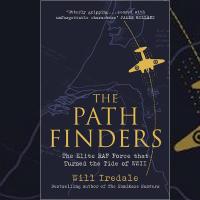Will Iredale’s The Pathfinders: The Elite RAF Force that Turned the Tide of WWII tells the thrilling story of the secret air force that turned Bomber Command from a damp squib into a deadly weapon that could strike fear into the heart of the enemy. Night after night and in all weathers, dodging searchlights, flak and enemy fighters, the Pathfinder crews would fly in the vanguard, finding targets and marking them with specially designed flares for the main force to bomb. Throughout the attack, master bombers would linger to ensure the strikes were as accurate as possible, exposing themselves to the worst of the dangers for the maximum time. It is hardly surprising that the average life expectancy for these crews was just 12 sorties, and at some points a mere eight. What is more surprising is that most were just teenagers or in their early twenties, yet they flew with exceptional skill and determination in the face of overwhelming odds. Following the experiences of just a few of these 20,000 remarkable men, and the people who supported them, Iredale brings to vivid life the awe-inspiring, jaw-dropping story of the strategic air campaign from an eagle’s eye view.
What is more surprising is that most were just teenagers or in their early twenties, yet they flew with exceptional skill and determination in the face of overwhelming odds. Following the experiences of just a few of these 20,000 remarkable men, and the people who supported them, Iredale brings to vivid life the awe-inspiring, jaw-dropping story of the strategic air campaign from an eagle’s eye view.
There is no doubt that Iredale’s subject matter is controversial: discussion of the area-bombing of German cities, and their civilian populations, is awkward at best, and some potential readers will no doubt be put off by concern that Iredale is glorifying mass death and destruction. This couldn’t be further from the truth. Regardless of the ethical dilemmas, Iredale convincingly shows that it is a subject worthy of discussion. Bomber Command played an important part in the Second World War, not only in reducing the industrial output of Nazi Germany but also in supporting Allied troops – and undertaking humanitarian work – during Operation Overlord and beyond. And the Pathfinders, who literally showed the way, played a central part in this.
This is not to say that the suffering of those on the ground is brushed aside. Iredale has taken pains to find eye-witness testimony of the men, women and children who were, night after night, on the receiving end of the RAF’s bombs, and their stories are told with as much feeling, as much empathy, as anything else. There is no squeamishness in describing the effects of the bombing, and no moral judgement from Iredale for either side. There is, instead, the desire to tell the story of an essential but often overlooked part of the Allied strategy during the Second World War in a balanced and understanding way.
Although German civilian and military personnel – along with many others who helped or hindered the Pathfinders – feature, there is no doubt that the stars of the book are the Pathfinders themselves. It is the stories of these men, and the ground staff and WAAF who worked with them, that give the book so much power. Some lived, some died, but all of them are shown not just as heroes, but as humans. The staggering feats of bravery are interspersed with touching love stories, anecdotes, and moments of frailty. Those who have passed – either then or more recently – are resurrected through letters, journals, and conversations with living relatives. Those few still remaining are given the chance to tell their side of the story, often for the first time, through conversations with the author. Many readers will have known someone who flew with Bomber Command, but far fewer will have had the chance to talk about their experiences in such depth. It is, perhaps, bittersweet that we get to hear of their exploits vicariously, but this is absolutely better than ignorance.
To say that each person’s biography is woven together to create a complete and engaging account is to undersell the book. It is, of course, true, but it does not encompass the whole. There are also the military and technical details, informative but unobtrusive; there are the statistical analyses, proving the unquestionable impact of the Pathfinders; there is commentary on strategy and the wider world, creating a subplot worthy of a political thriller. There is also the understated yet ever-present engagement with debates, both on the historical fact and its interpretation by modern audiences. To read The Pathfinders is to become a philosopher. For it makes one think about the pity of war, about ethics against necessity, about the brevity of life and the fortitude of ordinary people placed in impossible situations.
This is helped by a graceful, descriptive, and well-paced narrative style that is also superbly clever. Inherent contradictions are brought to the surface: the bucolic is juxtaposed with the grotesque, the adrenalin-filled rush with the paralysis of crushing fear. Moments of levity balance moments of crisis, and the pressure is kept on both the reader and the subject in an artful telling of this rollercoaster of a story. Reading it is to watch a master at his craft. Without doubt, this is the best work of military history I’ve read in a long time.
You can purchase The Pathfinders: The Elite RAF Force that Turned the Tide of WWII here.


